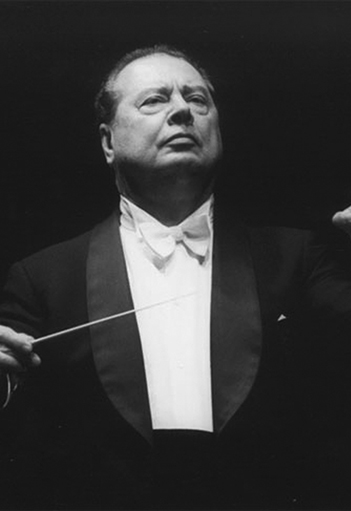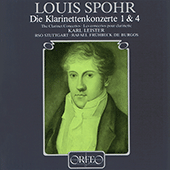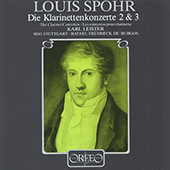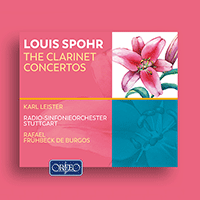Rafael Frühbeck de Burgos
The son of a Spanish mother and a German father living in Burgos, Rafael Fruhbeck added ‘de Burgos’ to his name when conducting abroad to identify himself as being Spanish. He started to learn the violin when he was seven, was performing in public by the time he was twelve, and went on to play in local orchestras as well as to conduct student groups. A pupil at the Bilbao and Madrid Conservatories, he focused primarily on the violin, and also conducted zarzuelas in small theatres in Madrid. As a member of the Spanish army he served as a director of music at Santander from 1953 to 1956 and after leaving the army he studied conducting at the Munich High School for Music with Kurt Eichhorn amongst others, from 1956 to 1958.
Fruhbeck returned to Spain as conductor of the Bilbao Symphony Orchestra from 1958 to 1962, and then was appointed chief conductor of the Spanish National Orchestra, remaining in this post until 1978. With this orchestra he performed much contemporary Spanish music, and became well-known as a conductor of choral works, performing for instance the St Matthew Passion of Bach in Spain for the first time. During this period Fruhbeck made several distinguished recordings for EMI, predominantly with the New Philharmonia Orchestra; guest-conducted widely in Europe, North and South America, and Japan; and was chief conductor of the Dusseldorf Symphony Orchestra (1966 to 1971), and of the Montreal Symphony Orchestra (1975 to 1976).
Following a lengthy period as principal guest conductor of the National Symphony Orchestra, Washington DC, from 1980 to 1990, Fruhbeck became chief conductor of the Vienna Symphony Orchestra (1991–1997) while also serving in a similar position at the German Opera House (Deutsche Oper) in Berlin (1992–1997). He was appointed chief conductor of the Berlin Radio Symphony Orchestra, formerly based in the German Democratic Republic (DDR), in 1994, and several recordings of him directing this orchestra have been published. He was awarded the Grand Cross of Civil Merit by the German Federal Republic in 2001, the year in which he was also appointed chief conductor of the Symphony Orchestra of Italian Radio in Turin. In 2004, he took up the post of chief conductor of the Dresden Philharmonic Orchestra.
Fruhbeck had shown himself to be an adept conductor of a wide range of repertoire, and avoided the musical ‘type-casting’ which tends to afflict conductors from his home country. His excellent recordings for EMI included stirring accounts of Haydn’s Die Schopfung, Mozart’s Requiem, Mendelssohn’s Elijah, and Orff’s Carmina Burana, all of which demonstrate his masterly ability to control large forces. His complete recording of Bizet’s Carmen, recorded with a strong cast in Paris, is a vivacious as well as powerful account of this popular score, and was the first to make use of the original spoken dialogue. He proved to be a sympathetic accompanist on disc in concertos that ranged from Beethoven to Khachaturian. Several recordings with the Vienna Symphony Orchestra had appeared, of music by Gottfried von Einem, Paul Hindemith and Richard Strauss. Fruhbeck’s excellent understanding of the core Austro-German repertoire had also been shown in recordings of music by Liszt with the Berlin Radio Symphony Orchestra released by the Swedish company, BIS.
Rafael Frühbeck de Burgos died on June 11, 2014.
© Naxos Rights International Ltd. — David Patmore (A–Z of Conductors, Naxos 8.558087–90).



















